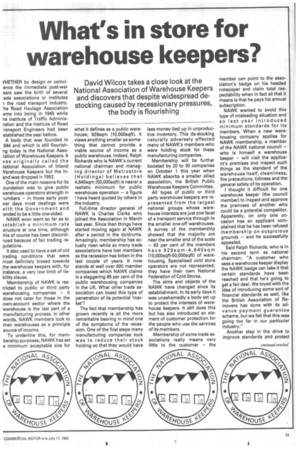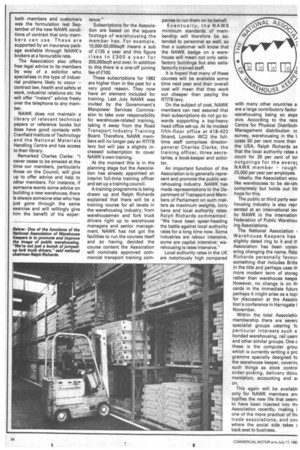What's in store for warehouse keepers?
Page 35

Page 36

If you've noticed an error in this article please click here to report it so we can fix it.
David Wilcox takes a close look at the National Association of Warehouse Keepers and discovers that despite widespread destocking caused by recessionary pressures, the body is flourishing
VHETHER by design or coincience the immediate post-war ears saw the birth of several rade associations or institutes
the road transport industry. he Road Haulage Association ame into being in 1945 while he institute of Traffic Adminisration and the Institute of Road -ransport Engineers had been istablished the year before.
A body that was founded in 944 and which is still flourishrig today is the National Asso:iation of Warehouse Keepers. It vas originally called the slational Association of Inland (Varehouse Keepers but the inand was dropped in 1952.
One of the main reasons for its oundation was to give public warehouse operators strength in lumbers — in those early postwar days most dealings were with the Government and :ended to be a little one-sided.
NAWK even went so far as to stablish a minimum rate 5tructure at one time, although this of course has been discontiqued because of fair trading regulations.
It also used to have a set of old trading conditions that were most definitely biased towards the warehouse keepers with, for instance, a very low limit of liability clause.
Membership of NAWK is restricted to public or third party warehousing companies — it does not cater for those in the own-account sector where the warehouse is the last part of a manufacturing process. In other words, NAWK members look to their warehouses as a principle source of income.
To underline this, for membership purposes, NAWK has set a minimum acceptable size for what it defines as a public warehouse; 929sqm (10,000sqft). It views anything smaller as something that cannot provide a viable source of income as a public warehouse. Indeed, Ralph Richards who is NAWK's current national chairman and managing director of Metrostore (Holdings) believes that 4,645sqm (50,000sqft) is nearer a realistic minimum for public warehouse operation — a figure I have heard quoted by others in the industry.
Full-time director general of NAWK is Charles Clarke who joined the Association in March last year. Since then things have started moving again at NAWK after a period in the doldrums. Amazingly, membership has actually risen while so many trade associations have lost members as the recession has bitten in the last couple of years. It now stands at well over 600 member companies which NAWK claims is a staggering 85 per cent of the public warehousing companies in the UK. What other trade association can boast this type of penetration of its potential 'market'?
The fact that membership has grown recently is all the more remarkable bearing in mind one of the symptoms of the recession. One of the first steps many manufacturing companies took was to reduce their stock holding so that they would have less money tied up in unproductive inventory. This de-stocking naturally adversely affected many of NAWK's members who were holding stock for these manufacturing companies.
Membership will be further boosted by 20 to 30 companies on October 1 this year when NAWK absorbs a smaller allied association, the British Public Warehouse Keepers Committee.
All types of public or third party warehouse keepers are represented from the largest national groups whose warehouse interests are just one facet of a transport service through to the smaller one-off warehouses. A survey of the membership showed that the majority are near the smaller end of the scale — 62 per cent of the members have 929sqm-4,645sqm (10,000sqft-50,000sqft) of warehousing. Specialised cold store operators are not represented; they have their own National Federation of Cold Stores.
The aims and objects of the NAWK have changed since its establishment. In its early days it was unashamedly a body set up to protect the interests of warehouse keepers. It still does this but has also introduced an element of customer protection for the people who use the services of its members.
Membership of some trade associations really means very little to the customer — the member can point to the association's badge on his headed notepaper and claim total respectability when in fact all that it means is that he pays his annual subscription.
NAWK wanted to avoid this type of misleading situation and so last year introduced minimum standards for its members. When a new warehousing company applies for NAWK membership, a member of the NAWK national council — who is himself a warehouse keeper — will visit the applicant's premises and inspect such things as the standard of the warehouse itself, cleanliness, fire precautions, tidiness and the general safety of its operation.
I thought it difficult for one warehouse keeper (the council member) to inspect and approve the premises of another who could be a potential competitor. Apparently, on only one occasion has an applicant complained that he has been refused membership on suspicious grounds — and he successfully appealed.
Said Ralph Richards, who is in his second term as national chairman: "A customer who sees a warehouse keeper display the NAWK badge can take it that certain standards have been reached and that he's going to get a fair deal. We toyed with the idea of introducing some sort of financial standards as well, like the British Association of Removers has done with its advance payment guarantee scheme, but we felt that this was going too far in our particular industry."
Another step in the drive to improve standards and protect both members and customers was the formulation last September of the new NAWK conditions of contract that only members can use. These are supported by an insurance package available through NAWK's brokers at a favourable rate.
The Association also offers free legal advice to its members by way of a solicitor who specialises in the type of industrial problems likely to occur — contract law, health and safety at work, industrial relations etc. He will offer "instant" advice freely over the telephone to any member.
NAWK does not maintain a library of relevant technical papers or reference books but does have good contacts with Cranfield Institute of Technology and the National Materials Handling Centre and has access to their library.
Remarked Charles Clarke: "I never cease to be amazed at the time our members, particularly those on the Council, will give up to offer advice and help to other members. For instance, if someone wants some advice on building a new warehouse, there is always someone else who has just gone through the same exercise and will willingly give him the benefit of his exper ience."
Subscriptions for the Association are based on the square footage of warehousing the member has. For example, 10,000-50,000sqft means a sub of £135 a year and this figure rises to £3 0 0 a year for 200,000sqft and over. In addition to this there is a one-off joining fee of £100.
These subscriptions for 1982 are higher than in the past for a very good reason. They now have an element included for training. Last July NAWK was invited by the Government's Manpower Services Commission to take over responsibility for warehouse-related training, taking it away from the Road Transport Industry Training Board. Therefore, NAWK members will no longer pay an RTITB levy but will pay a slightly increased subscription to cover NAWK's own training.
At the moment this is in the planning stage but the Association has already appointed an interim full-time training officer and set up a training council.
A training programme is being drawn up and Ralph Richards explained that there will be a training course for all levels in the warehousing industry, from warehousemen and fork truck drivers right up to warehouse managers and senior management. NAWK has not got the facilities to run the courses itself and so having decided the course content the Association will nominate approved commercial transport training corn panies to run them on its behalf.
Eventually, the NAWK minimum standards of membership will therefore be extended to personnel as well, so that a customer will know that the NAWK badge on a warehouse will mean not only satisfactory buildings but also satisfactorily trained staff.
It is hoped that many of these courses will be available some time next year and their overall cost will mean that they work out cheaper than paying the RTITB levy.
On the subject of cost, NAWK members can rest assured that their subscriptions do not go towards supporting a top-heavy head office set-up. At its modest fifth-floor office at 418-422 Strand, London WC2 the fulltime staff comprises directorgeneral Charles Clarke, the training officer, three secretaries, a book-keeper and solicitor.
An important function of the Association is to generally represent and promote the public warehousing industry. NAWK has made representations to the Department of Transport and Members of Parliament on such matters as maximum weights, lorry bans and local authority rates. Ralph Richards commented: "We have been spear-heading the battle against local authority rates for a long time now. Some industries are labour intensive, some are capital intensive; warehousing is rates intensive."
Local authority rates in the UK are notoriously high compared with many other countries al are a large contributory factor warehousing being so expe sive. According to the rece Centre for Physical Distributh Management distribution cc survey, warehousing in the L costs 50 per cent more than the USA. Ralph Richards sa that the local authority rates a count for 26 per cent of tol outgoings for the averac NAWK member — rough £5,000 per year per employee.
Ideally, the Association wou like warehouses to be de-rat( completely but holds out litt hope for this.
The public or third party war housing industry is also repr sented at an international lev by NAWK in the Internation Federation of Public Warehou ing Associations.
The National Association Warehouse Keepers has slightly dated ring to it and th Association has been consir ering changing the name. Ralp Richards personally favour something that includes Britis in the title and perhaps uses th more modern term of storag rather than warehouse keepe However, no change is on th cards in the immediate future perhaps it might arise as a topi for discussion at the Associe tion's conference in Harrogate i November.
Within the total Associatio membership there are severe specialist groups catering fa particular interests such a bonded warehousing, rail user: and other similar groups. One c these is the computer grout which is currently writing a pro gramme specially designed fo the warehouse keeper, coverini such things as stock control order-picking, delivery docu mentation, accounting and sr on.
This again will be availabh only for NAWK members an typifies the new life that seem: to have been injected into th( Association recently, making i one of the more practical of th( trade associations, and on where the social side takes E back seat to business.
















































